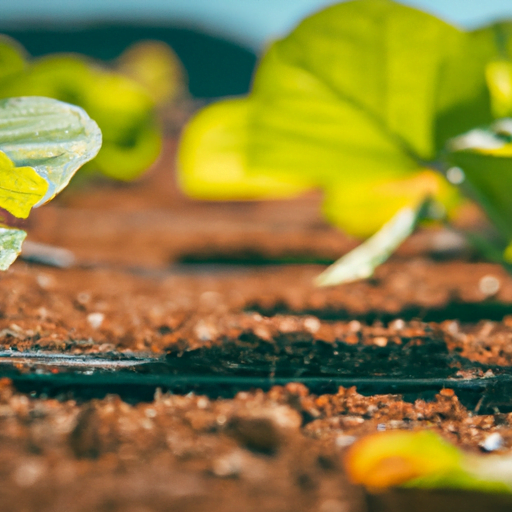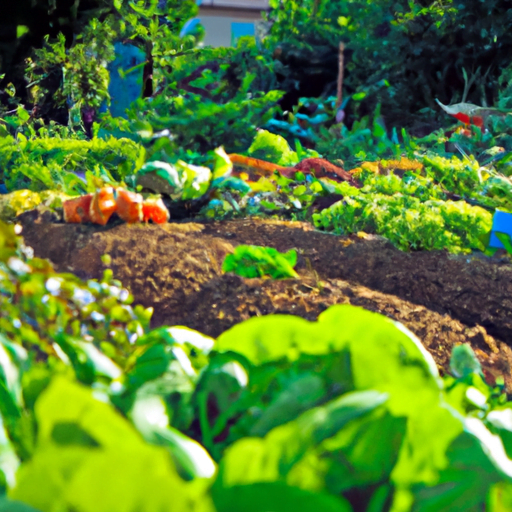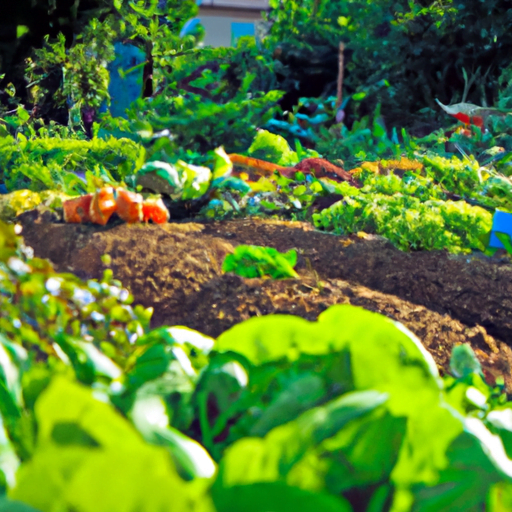So, you’ve decided to live off the grid? That’s awesome! It’s a great way to reconnect with nature and become self-sufficient. But here’s the thing, if you’re going to be living off grid, you’ll need to find a way to sustain yourself financially. And what better way to do that than by growing your own crops? Now, I know what you’re probably thinking – what’s the most profitable thing you can grow? Well, fret not, my friend, because in this article, we’re going to explore the most profitable crops to grow off grid.
Growing your own crops off grid can be a rewarding experience both personally and financially. Not only will you be able to provide fresh and healthy food for yourself and your family, but you can also sell the surplus crops and make some extra cash. In fact, some crops have the potential to generate a significant income. Interested? Well, keep reading to discover which crops are the most profitable and why.
One of the most profitable crops you can grow off grid is microgreens. These tiny plants are harvested just a few weeks after sowing and are sold for a high price due to their intense flavor and nutritional value. Other profitable crops include medicinal herbs like lavender and echinacea, which are in high demand for their various health benefits. And let’s not forget about mushrooms! Cultivating gourmet mushrooms, such as shiitake or oyster mushrooms, can bring in a good income too.
So, there you have it – a sneak peek into the world of profitable crops to grow off grid. In the full article, you’ll learn more about these crops, their growing requirements, and how to market them effectively. So, if you’re ready to transform your off grid lifestyle into a profitable venture, read on and discover the exciting possibilities that await you. Living off the grid is becoming an increasingly popular lifestyle choice for many individuals and families. The idea of relying on one’s own resources, living sustainably, and embracing self-sufficiency has a certain allure that appeals to those seeking a simpler and more independent way of life. One of the key components of off grid living is the ability to grow your own food. Not only does this provide a source of fresh produce, but it can also be a profitable venture if done right. In this article, we will explore the most profitable crops to grow off grid, as well as the benefits and challenges associated with this endeavor.
Benefits of Living Off Grid
There are numerous benefits to living off the grid, and growing profitable crops is just one of them. By embracing this lifestyle, you are able to reduce your dependency on external resources and maintain a level of self-sufficiency. This can lead to financial independence and a sense of security, knowing that you have the ability to sustain yourself.
In addition, off grid living encourages sustainable practices. By growing your own food, you are able to reduce your carbon footprint and minimize the environmental impact of transportation and industrial farming. This can translate into a healthier lifestyle for you and your family, as well as a more sustainable future for the planet.
Challenges of Living Off Grid
While the benefits of living off grid are enticing, it is important to also consider the challenges that come with this lifestyle. One of the primary challenges is limited access to infrastructure and services. Living in remote areas can make it difficult to obtain necessary supplies, equipment, and services, such as electricity and internet connectivity. This can impact the efficiency and productivity of your off grid farming endeavors.
Weather-related risks also pose a challenge for off grid farmers. Depending on the geographical location, you may be susceptible to extreme weather conditions, such as droughts, floods, or frost. These weather events can negatively impact crop yield and profitability. It is important to develop strategies for mitigating these risks, such as implementing proper irrigation systems and practicing crop rotation.
Efficient use of limited land is another challenge faced by off grid farmers. In most cases, off grid properties have limited acreage, and it is crucial to maximize the yield from the available land. This requires careful planning, crop selection, and agricultural techniques to ensure that you are utilizing the space effectively and generating the highest possible returns.
Sustainable Practices in Off Grid Living
Living off the grid inherently promotes sustainable practices. By growing your own food, you are engaging in sustainable agriculture and reducing your reliance on industrial farming methods. However, there are additional practices you can implement to further enhance the sustainability of your off grid farming.
Effective water management is crucial for sustainable off grid farming. Implementing efficient irrigation systems, such as drip irrigation or rainwater harvesting, can help conserve water and minimize waste. Additionally, incorporating composting and organic matter into your soil can improve its fertility and reduce the need for synthetic fertilizers.
Integrated pest management strategies can also contribute to sustainable off grid farming. By implementing a combination of biological control methods, such as introducing beneficial insects, and cultural practices, such as crop rotation, you can minimize the use of chemical pesticides and promote a healthy ecosystem on your off grid farm.

The Most Profitable Crops to Grow Off Grid
Now that we have discussed the benefits, challenges, and sustainable practices associated with off grid farming, let’s explore the most profitable crops to grow in this setting. Before choosing which crops to cultivate, it is important to consider several factors that can influence their viability.
Factors to Consider Before Choosing Crops
Climatic conditions and soil suitability are important considerations when selecting crops for off grid farming. Different crops have varying temperature, humidity, and soil pH requirements. It is essential to choose crops that are well-suited to the environmental conditions of your off grid property to ensure their success and profitability.
Market demand and profitability are crucial factors to take into account. You should research the demand for specific crops in your local area and assess the potential profitability. High-value crops that are in high demand can generate significant returns, especially if you establish relationships with potential buyers and explore niche markets.
Crop rotation and diversification are essential for sustainable off grid farming. Rotating crops helps prevent the depletion of nutrients in the soil and reduces the risk of pests and diseases. Additionally, diversifying your crop selection can protect against market fluctuations and provide a wider range of produce for both personal consumption and sale.
High-Value Crops for Off Grid Farming
There are several high-value crops that are suitable for off grid farming. Organic fruits and vegetables are always in demand, as consumers increasingly prioritize healthy and sustainable food options. Crops such as tomatoes, peppers, strawberries, and leafy greens can be profitable choices for off grid growers.
Herbs and medicinal plants are also high-value crops that can be grown off grid. Many culinary and medicinal herbs have a high market demand due to their unique flavors and health benefits. Examples of profitable herbs include basil, mint, rosemary, lavender, and echinacea.
Specialty crops and niche markets present an opportunity for off grid farmers to differentiate themselves and command premium prices. Examples of specialty crops include gourmet mushrooms, microgreens, heirloom varieties of fruits and vegetables, and exotic spices.
Potential Markets for Off Grid Crops
Once you have selected the profitable crops to grow off grid, it is important to consider potential markets for your produce. Local farmers’ markets and community-supported agriculture (CSA) programs are excellent avenues for selling your off grid crops. These platforms allow you to directly connect with consumers who value locally-grown and sustainable produce.
Restaurants and farm-to-table initiatives are another potential market for off grid farmers. Many restaurants and chefs are increasingly sourcing their ingredients from local farmers, who can provide fresh and unique produce that meets their culinary needs. Establishing relationships with restaurants in your area can lead to consistent sales and a loyal customer base.
Direct-to-consumer online platforms, such as e-commerce websites and online farmers’ markets, offer off grid farmers the opportunity to reach a wider customer base. These platforms allow you to ship your produce directly to customers’ doorsteps, eliminating the need for physical storefronts and expanding your market reach beyond your local area.
Tips for Successful Off Grid Crop Production
To ensure successful off grid crop production, there are several tips and practices that you should implement:
Effective irrigation and water management is crucial for crop success. Consider implementing drip irrigation systems or rainwater harvesting techniques to conserve water and avoid overwatering.
Composting and soil fertility should be prioritized to maintain healthy and nutrient-rich soil. Compost organic matter from your off grid property, such as food waste and plant trimmings, to enhance soil fertility and reduce the need for synthetic fertilizers.
Integrated pest management strategies can help reduce the use of chemical pesticides. Implement practices such as crop rotation, beneficial insect introduction, and natural pest repellents to promote a balanced ecosystem and minimize pest damage.
Conclusion
In conclusion, growing profitable crops off grid can offer financial independence, reduced dependence on external resources, and environmental benefits. By considering factors such as climatic conditions, market demand, and crop rotation, you can select high-value crops that are well-suited to your off grid property. Additionally, exploring potential markets and implementing sustainable practices will contribute to the success and profitability of your off grid farming venture. Embrace the self-sufficiency and sustainable practices of off grid living, and enjoy the rewards of growing the most profitable crops.





